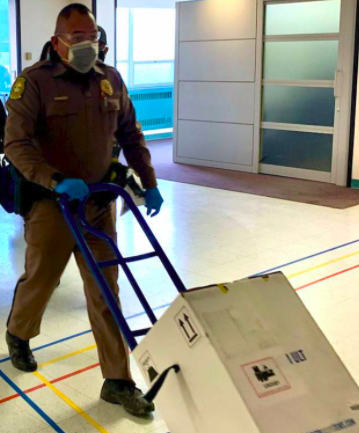
- Details
- By Native News Online Staff
GALLUP, Ariz. — On Monday, Navajo Nation President Jonathan Nez and Vice President Myron Lizer visited the Gallup Indian Medical Center as the Navajo Area IHS received the first shipment of the Pfizer-BioNTech vaccines for COVID-19. The process of distributing the vaccine to other health care facilities on the Navajo Nation, including health care clinics, also began on Monday. More vaccines are expected to be delivered on Tuesday.
The vaccine will be administered based on the Centers for Disease Control’s phased distribution plan that calls for health care workers and those living in long-term assisted living facilities to receive the vaccine first, on a volunteer basis.
The Navajo Nation opted to have the Navajo Area IHS oversee the distribution of the Pfizer COVID-19 vaccine, with the exception of the Utah Navajo Health System, which opted to work with the state of Utah for distribution. The Utah Navajo Health System reported that the vaccines will be delivered later this month, in accordance with its agreement with the state.
“Today is a historic day in this fight against COVID-19. With the vaccine in hand for our health care workers and those living in nursing homes, it provides more hope and optimism for our health care workers who have worked non-stop and for all of our Navajo people. We have to be mindful that this will be a long process and we cannot let down our guard. We have to keep fighting COVID-19 together by staying home as much as possible, wear a mask, avoid crowds and gatherings, practice social distancing, and wash your hands often. The fight is not over, but the Pfizer vaccine provides us with another tool to help overcome the COVID-19 pandemic,” said Navajo Nation President Jonathan Nez.
More Stories Like This
Native News Weekly (August 25, 2024): D.C. BriefsScope Narrowed, Report Withheld: Questions Mount Over Michigan Boarding School Study
Zuni Youth Enrichment Project Announces Family Engagement Night and Spring Break Youth Programming
Next on Native Bidaské: Leonard Peltier Reflects on His First Year After Prison
Deb Haaland Rolls Out Affordability Agenda in Albuquerque
Help us defend tribal sovereignty.
At Native News Online, our mission is rooted in telling the stories that strengthen sovereignty and uplift Indigenous voices — not just at year’s end, but every single day.
Because of your generosity last year, we were able to keep our reporters on the ground in tribal communities, at national gatherings and in the halls of Congress — covering the issues that matter most to Indian Country: sovereignty, culture, education, health and economic opportunity.
That support sustained us through a tough year in 2025. Now, as we look to the year ahead, we need your help right now to ensure warrior journalism remains strong — reporting that defends tribal sovereignty, amplifies Native truth, and holds power accountable.
 The stakes couldn't be higher. Your support keeps Native voices heard, Native stories told and Native sovereignty defended.
The stakes couldn't be higher. Your support keeps Native voices heard, Native stories told and Native sovereignty defended.
Stand with Warrior Journalism today.
Levi Rickert (Potawatomi), Editor & Publisher

